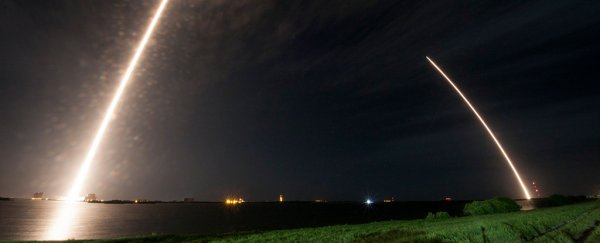It's another proud day for Elon Musk. Engineers at SpaceX have managed to land a Falcon 9 rocket on solid ground for the second time ever, and it's the fifth successful recovery overall.
The rocket touched down at 12:53am EDT just 8 minutes after taking off, having completed its main job of launching the Dragon spacecraft towards the ISS with fresh supplies for the astronauts living there.
As Dragon continued on its journey, the first-stage Falcon 9 booster descended back to the ground, hitting Landing Zone 1 at Cape Canaveral as planned. The second-stage part of the rocket, which isn't reusable, went on to power the Dragon into orbit.
You can check out our live Snapchat story from the launch (username: sciencealert), and the full SpaceX livestream below:
The last six attempts SpaceX has made to land a Falcon 9 rocket have been on an autonomous drone ship out in the Atlantic Ocean, which require less fuel, meaning more can be used for whatever mission the rocket is carrying out.
Out at sea, the drone ship can move to 'catch' the Falcon 9, so the rocket itself doesn't have to do quite as much booster firing. Three of those last six ocean landings have been a failure, but three have been a success.
This time, it was back to a precision landing on the ground, a feat SpaceX last accomplished in December 2015, and the team nailed it. It seems practice makes perfect (for rockets at least).
So why all the fuss? Well, not only is this a phenomenal achievement in modern science and engineering, it's also going to mean going to space is a lot cheaper in the future – the cost of a brand new Falcon 9 rocket is in the region of $62 million, having the ability to reuse parts of it makes the price tag plummet.
Plus, if we want to go to Mars and somehow get back, it's going to be handy having a rocket we can use again on the surface of the Red Planet (the manufacturing facilities on Mars aren't yet on a par with those on Earth).
So far, we haven't seen any of the five recovered Falcon 9 rockets reused in other missions, but SpaceX is planning to do this in September or October. In fact, it's running out of room to store its used rockets, as Loren Grush reports at The Verge.
That's a good problem to have, though, and the SpaceX staff will be working hard to make sure every future Falcon 9 rocket can land itself again safely. After that, attention turns to the Falcon Heavy, due to come into service later this year and carrying enough thrust to take human beings into space.
If you want to relive the moment that the Falcon 9 made space history (again), check out the full live webcast of the event below… there's even a Pokémon Go joke to watch out for.
Meanwhile, Blue Origin, led by Amazon's Jeff Bezos, continues to make strides forward with its own reusable rockets, although these are smaller and don't have the same size payload as the Falcon 9 made by SpaceX.
Here are some of the images from the launch below, from SpaceX's Flickr stream:




We're all really excited to see what SpaceX achieves next!
